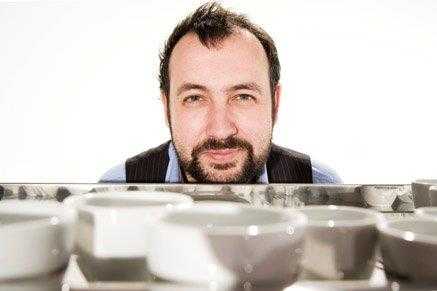My lack of knowledge when it came to single-boiler espresso machines irked me more and more as my knowledge grew. But I was starting to develop an understanding of how my technique affected the brew, and was slowly learning just how big a role roasting and origin played. These two gaping holes in my knowledge took priority, and I suppose truly understanding the heat-exchange system fell to the wayside.
It wasn’t until I won the World Barista Championship in 2008, and was fortunate enough to meet and start a relationship with the crew at Nuova Simonelli that the heat-exchange gap in my learning curve was filled. I was invited to Tolentino to see how the Aurelia espresso machine, a single-boiler, heat-exchange system, passed the rigorous tests set by the World Barista Championship and became the new official machine sponsor.
Initially I was skeptical of the machine, but only because I still held affection for the machines that broke me in. It can be off-putting when you first wrap your hand around an alien portafilter and lock it into a group. Yet unlike many other machines, the Aurelia had a satisfying weight to its parts as well as evidence of good craftsmanship.
On the Aurelia, you immediately notice the functionality of the brew buttons, which are specially designed and organized to withstand the most rapid use. Following that, the steam wand lever is impressively ergonomic and easy to use—something the twisting-knob method is not. Small details like the basket design for the portafilters are particularly pleasing, as they are well machined and easy to clean quickly and effectively. The flow rate is suitably slow as a result of 0.5 flow restrictors, and despite my early reservations about heat-exchange machines, the espresso made on an Aurelia tastes great.
It was fascinating to learn about the thermo-symphonic system employed by numerous machine companies, and how Nuova Simonelli developed it to deliver stable water temperature to the group. The Aurelia group is made of solid brass and weighs 4.7 kilos, to ensure minimal heat dissipation. On talking to the team behind the machine, I learned how they worked—and continue to work—with three universities to better understand the brewing process, which in turn will enable them to design better machines. The Aurelia is the product of an incredible amount of research hours, which seem to have paid off.
I don’t have a favorite espresso machine. Many machines out there are capable of brewing delicious espresso. Sadly, the main thing that holds back most of them from achieving their purpose is people not taking care of them. I’ve often speculated that if any café were to take on a cleaning regimen with their espresso machine that ensured no espresso was ever tainted, they would immediately elevate themselves into the top 10 percent of cafés in the world, regardless of their technique.
The barista craft is slowly gaining awareness and respect. Through platforms like the World Barista Championship, and all its associated national and regional competitions, people who make coffee for a living are being made aware of higher standards and of the many hands the coffee passed through before reaching them. Yet we are not at a point where being a barista is a viable career choice.
In very few cases baristas are earning a wage that could support a family, and rarely does a barista receive the kind of respect a top sommelier or chef garners. There are many reasons for this, not least that the product they sell is so inexpensive, something that will change as the specialty market develops. You can taste some of the best coffees in the world right now for under $10. Considering the many parallels coffee shares with other gourmet products such as wine and beer, where the significance of terroir and process are so commonly appreciated, quality coffee must surely be considered a bargain. Especially when it’s not boiling hot or requiring two sugars to taste its sweetness.


















